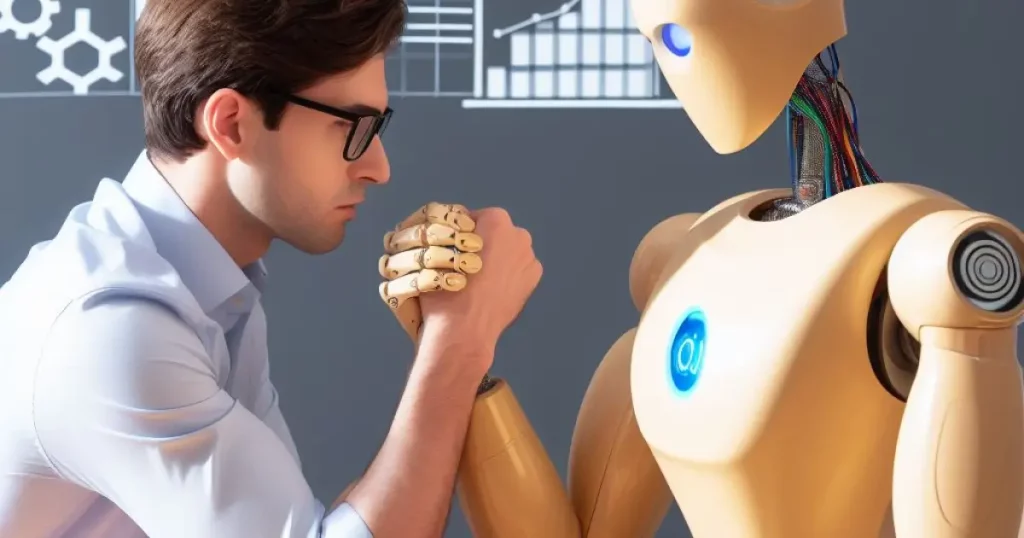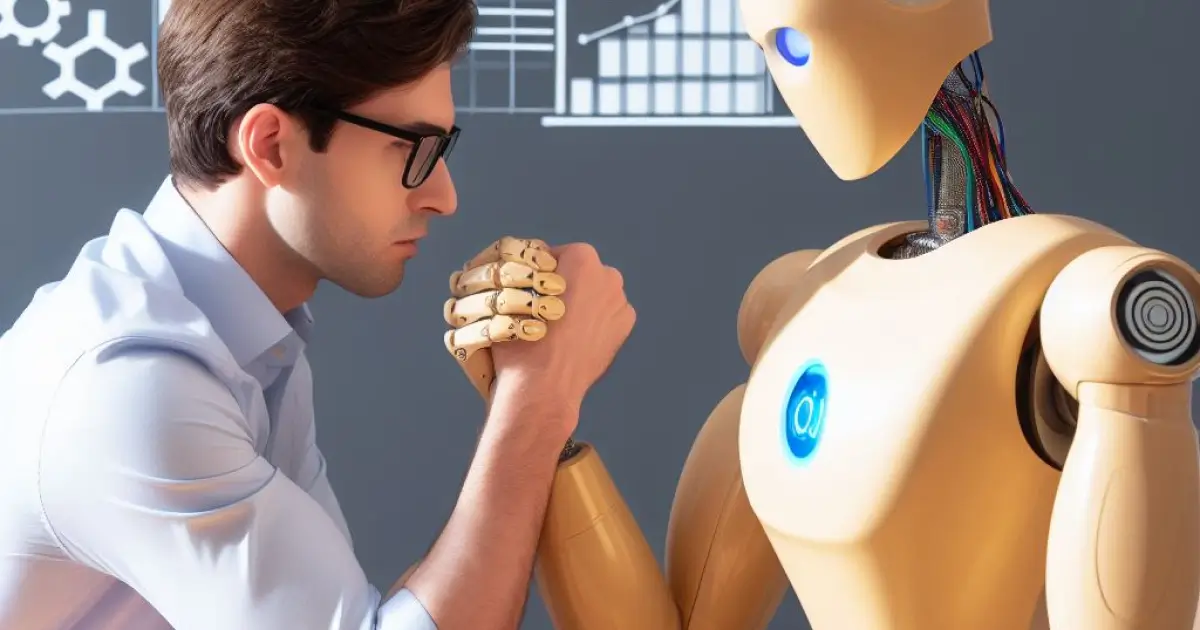
If you are here, you have probably witnessed the power of artificial intelligence (AI). Most people fear this technology will take their jobs, including computer programmers. This article will explore the implications of AI on the future of programming and the world at large.
Table of Contents
Key Takeaways
• ChatGPT is designed to assist programmers and software engineers by identifying coding errors, automating tasks, and generating new code. Still, it lacks the human touch and is not at the level of artificial general intelligence.
• AI tools like ChatGPT significantly enhance programming speed and skills by utilizing deep learning techniques and generating Python code for daily tasks and complex processes.
• The partnership between programmers and AI tools like ChatGPT revolutionizes programming by automating mundane tasks and allowing programmers to focus on more complex challenges, thereby increasing efficiency and speed.
• While ChatGPT and other AI tools may automate repetitive tasks and potentially replace specific jobs, they are not set to replace computer programmers. This is especially because they lack the necessary artificial general intelligence for producing good software independently. Instead, they may shift job responsibilities to more complex, higher-level tasks and offer better job security.
Will ChatGPT Replace Programmers?
As a programmer, you’re probably wondering if ChatGPT’s impressive capabilities might render your skills obsolete. ChatGPT, despite its advanced AI, isn’t a threat but a tool for developers and software engineers.
It assists in identifying coding errors, automating tasks, and even writing new code. However, it’s not an infallible machine-learning tool. It lacks the human touch—a nuanced understanding of context and creativity that you bring to the table.
While it’s a leap towards artificial general intelligence, it’s not there yet. Moreover, the very creation and maintenance of such AI systems present new opportunities in the realm of computer programming.
10X Your Programming Speed and Skills Using ChatGPT
Leveraging AI tools like ChatGPT can significantly boost your programming speed and enhance your skills, serving as a powerful ally in your coding endeavors. As a generative conversational AI developed by OpenAI, ChatGPT offers a natural language chatbot that utilizes deep learning techniques.
It operates on neural networks, specifically a language model trained on vast swathes of internet text. This lets you quickly generate Python code, assisting in daily tasks and complex processes. If you’re preparing for a coding interview, ChatGPT can be a valuable resource, offering practice and guidance.
However, it’s essential to remember that AI can’t yet replace the creativity and problem-solving skills programmers offer. Also, be vigilant as ChatGPT occasionally ‘hallucinates,’ requiring your intervention for accurate results.
A Match Made In (AI) Heaven
In your journey as a programmer, the harmony between your skills and AI tools like ChatGPT can be a significant game-changer. These AI tools, powered by machine learning algorithms trained on vast training data reserves, are revolutionizing how computer programmers work.
The natural language processing capabilities of ChatGPT allow it to generate code, acting as an automation tool that can handle mundane tasks. This leaves you free to focus on more complex challenges. Alongside other DevOps tools, ChatGPT can increase efficiency and speed, resulting in better code output.
While AI tools can’t replace programmers’ creativity and human touch, the partnership formed is like a match made in (AI) heaven, enhancing the overall programming process.
Will ChatGPT Take Away Tech Jobs?
Despite the impressive capabilities of ChatGPT, you shouldn’t worry about it snatching away your tech job. While it’s true that this advanced AI can automate certain tasks, it’s not set to replace computer programmers.
It lacks AGI, or Artificial General Intelligence, necessary for producing good software independently. Current research suggests that ChatGPT will likely modify the job market, not obliterate it.
Automating repetitive tasks can enhance productivity, letting you focus on complex, higher-level tasks. This shift in job responsibilities may offer better job security, as you’ll be needed for tasks that demand human intelligence.
Jobs ChatGPT Will Replace
Jobs involving repetitive tasks, such as data entry clerks and customer service representatives, may be at risk as AI tools like chatbots, powered by ChatGPT, can automate these tasks.
Similarly, content creators, copywriters, and translators could face competition from machine learning engineering that generates human-like text.
Virtual assistants, powered by cloud computing, could replace administrative assistants.
In the realm of software as a service and infrastructure as a service, roles could shift as ChatGPT and similar tools streamline tasks.
New Jobs Await
As you navigate the evolving tech landscape, you’ll find that new job opportunities are emerging, not disappearing, in the wake of AI tools like ChatGPT.
Roles in the realm of ChatOps and continuous integration are on the rise, focusing on seamless code integration and delivery. Experienced professionals in continuous deployment must ensure a streamlined transition from development to production.
Infrastructure as code and configuration management skills are in high demand, with tools such as Puppet, Chef, Ansible, and SaltStack taking center stage. These tools facilitate automated setup, reducing errors and enhancing system reliability.
Can ChatGPT Replace Computer Programmers?
While ChatGPT could streamline some programming tasks, it’s unlikely to replace programmers entirely. It’s a tool, not an adversary. Yes, it may automate routine coding, but it can’t match a human’s creativity or problem-solving skills.
Jobs might shift, but new ones will emerge. So, don’t fear AI. Embrace it, adapt to it, and let it amplify your skills. Remember, the future isn’t written in code. It’s shaped by those who know how to use it.
Frequently Asked Questions:
How Does ChatGPT Work On a Technical Level?
ChatGPT analyzes input, predicts the next words, and forms responses. It’s trained on diverse text but doesn’t understand context like humans. It’s about patterns, not comprehension.
Can Artificial Intelligence Replace Coders?
AI systems are limited by their inability to think outside their programmed parameters. Therefore, AI can enhance and improve coding and development, but it’s unlikely ever to replace coders and developers entirely.
Can ChatGPT Be Used in Other Industries Outside of Programming?
Absolutely, you can use ChatGPT in various industries outside of programming. It’s versatile in tasks like customer support, content generation, and language translation, enhancing efficiency and productivity in numerous professional fields.
How Does the Accuracy of ChatGPT Compare to Human Programmers?
While ChatGPT’s accuracy is impressive, it can’t match a human programmer’s ability. You’ll find that AI often misses nuances or makes errors a human wouldn’t. It’s a helpful tool but not a replacement.
What Are the Ethical Implications of Using AI Tools Like ChatGPT?
AI tools like ChatGPT aren’t ethical nightmares. They’re tools guided by human input. Misuse can raise ethical concerns, such as privacy or misinformation, but correctly used, they’re simply powerful aids for communication tasks.
